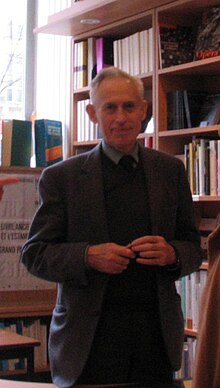Richard Swinburne
Richard Swinburne (born December 26, 1934 ) is a British philosopher of religion and professor of the philosophy of religion at Oxford University .
Life and teaching
Swinburne studied philosophy and theology at Oxford University and then taught at the universities of Oxford, Leeds, Hull and Keele. From 1985 to 2002 he held the position of Nolloth Professor of the Philosophy of the Christian Religion at Oxford University. Originally an Anglican , he has been a member of the Greek Orthodox denomination since 1995 .
His most important publications deal with the philosophy of religion, an area in which Swinburne is considered to be one of the greatest philosophers of the 20th century. In the trilogy The Coherence of Theism , The Existence of God and Faith and Reason he deals with the problem of natural theology. The first work examines the question of whether the statement “ God exists” is free of contradictions, the second whether there are reasons to believe it to be true, the third discusses the epistemological position of belief and its relationship to reason . In the tetralogy from The Evolution of the Soul , Responsibility and Atonement , Revelation and The Christian God , he argues for the truth of the content of the traditional Christian religion.
By far the most important of his works is The Existence of God . Swinburne here applies the method of inductive inference to the question of the existence of God. There is no longer any attempt to prove that God exists, but only that his existence is probable. According to Swinburne there are different phenomena in the world, according to a statement demanding (that one world is the order of the world , awareness etc.), although not with the methods of science could be explained. Instead, these phenomena can be better explained if we assume that they go back to God, because God has good reasons in each case to create an orderly world and the various phenomena. In addition, the God hypothesis is very simple, a decisive criterion for probability for Swinburne . Swinburne is of the opinion that the evil in the world speaks against the existence of God, but only to the extent that it is, because there are good reasons for God to allow evil, e.g. B. that only such a free will is possible. Taken together, these phenomena made the existence significantly more probable than its non-existence. To this end, Swinburne drafts an argument from religious experience that says: If we have an experience of something, we should assume that it exists as long as there are no reasons against it and it is not entirely improbable. It has been shown that God's existence is not entirely improbable, so we should trust our religious experiences and assume that God exists.
The main criticism of Swinburne's approach was that in many cases it is arbitrary which probabilities we assume for certain phenomena (such as that there is a universe but no God) and that simplicity should not be equated with probability. In addition, Swinburne in many places in his work presupposes moral and aesthetic assumptions as objective truths (e.g. that it is good to have free will, even if this brings suffering), although they are at least controversial. His argument from religious experience is often rejected as being based on an ultimately naive epistemology. He is also accused that his strictly rationalist image of God does not do justice to the existential dimensions and the meaning of the Christian religion in the real world.
Works
- Space and Time . London 1968
- The Concept of Miracle . London 1971
- An Introduction to Confirmation Theory . London 1973
- The Coherence of Theism . Clarendon Press, Oxford 1977
- The Existence of God . Clarendon Press, Oxford 1979, second enlarged edition 2004
- Faith and Reason . Clarendon Press, Oxford 1981, second revised edition 2005
- The Evolution of the Soul Clarendon Press, Oxford, 1986
- Responsibility and Atonement Clarendon Press, Oxford, 1989
- Revelation Clarendon Press, Oxford, 1991
- The Christian God Clarendon Press, Oxford, 1994
- Is there a God? . Clarendon Press, Oxford 1996
- Providence and the Problem of Evil , Clarendon Press, Oxford 1998
- The Resurrection of God Incarnate . Clarendon Press, Oxford 2003
German publications
- The Existence of God , P. Reclam, Stuttgart 1987
- Is there a god? Ontos Verlag, Heusenstamm 2006
- Faith and Reason , Echter Verlag, Würzburg 2009
Autobiography
- Richard Swinburne: Intellectual Autobiography . In: A. Padgett (ed.): Reason and the Christian Religion. Essays in honor of Richard Swinburne . Oxford 1999.
Web links
- Literature by and about Richard Swinburne in the catalog of the German National Library
- Homepage of Richard Swinburne at Oxford University
Individual evidence
- ^ R. Swinburne: Is there a God? , 139.
| personal data | |
|---|---|
| SURNAME | Swinburne, Richard |
| BRIEF DESCRIPTION | British religious philosopher |
| DATE OF BIRTH | December 26, 1934 |
